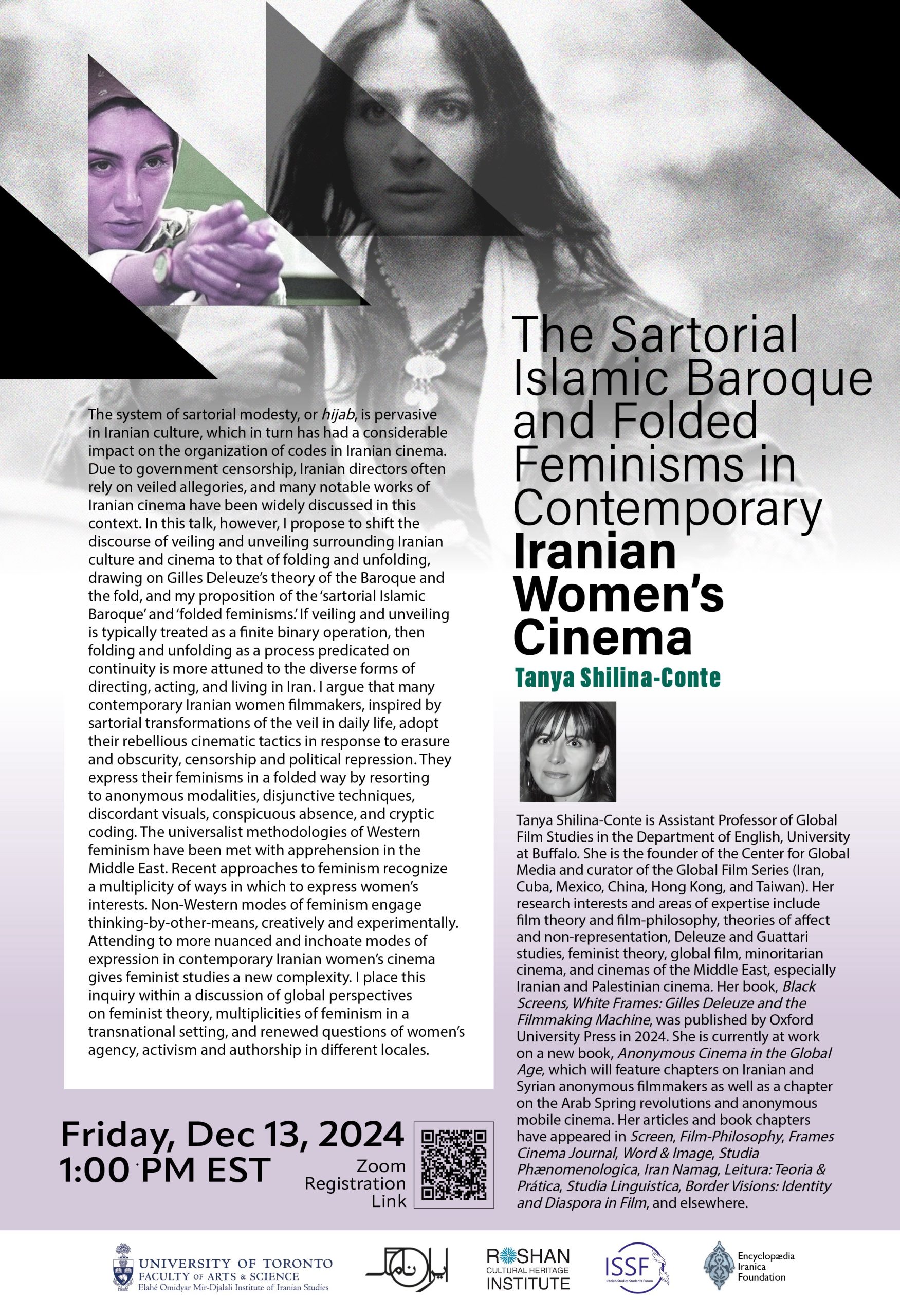

The Elahé Omidyar Mir-Djalali Institute of Iranian Studies, University of Toronto,
presents
The Sartorial Islamic Baroque and Folded Feminisms in Contemporary Iranian Women’s Cinema
Tanya Shilina-Conte, Assistant Professor, University at Buffalo
Friday, 13 December 2024, 1:00 p.m. Eastern Time
Zoom Meeting Registration:
https://utoronto.zoom.us/meeting/register/tZMlcumgrDMpEtV3yH86PRcRx2FVrVwYjYNj
After registering, you will receive a confirmation email containing information about joining the meeting.
Abstract:
The system of sartorial modesty, or hijab, is pervasive in Iranian culture, which in turn has had a considerable impact on the organization of codes in Iranian cinema. Due to government censorship, Iranian directors often rely on veiled allegories, and many notable works of Iranian cinema have been widely discussed in this context. In this talk, however, I propose to shift the discourse of veiling and unveiling surrounding Iranian culture and cinema to that of folding and unfolding, drawing on Gilles Deleuze’s theory of the Baroque and the fold, and my proposition of the ‘sartorial Islamic Baroque’ and ‘folded feminisms.’ If veiling and unveiling is typically treated as a finite binary operation, then folding and unfolding as a process predicated on continuity is more attuned to the diverse forms of directing, acting, and living in Iran. I argue that many contemporary Iranian women filmmakers, inspired by sartorial transformations of the veil in daily life, adopt their rebellious cinematic tactics in response to erasure and obscurity, censorship and political repression. They express their feminisms in a folded way by resorting to anonymous modalities, disjunctive techniques, discordant visuals, conspicuous absence, and cryptic coding. My focus on different modes of women’s authorship (including anonymity) in Iran as an expression of plural feminisms is in part a response to contentious characterizations surrounding the Islamic veil and its familiar repressive associations. The universalist methodologies of Western feminism have been met with apprehension in the Middle East. Recent approaches to feminism recognize a multiplicity of ways in which to express women’s interests. Non-Western modes of feminism engage thinking-by-other-means, creatively and experimentally. Attending to more nuanced and inchoate modes of expression in contemporary Iranian women’s cinema gives feminist studies a new complexity. I place this inquiry within a discussion of global perspectives on feminist theory, multiplicities of feminism in a transnational setting, and renewed questions of women’s agency, activism and authorship in different locales.
Bio:
Tanya Shilina-Conte is Assistant Professor of Global Film Studies in the Department of English, University at Buffalo. She is the founder of the Center for Global Media and curator of the Global Film Series (Iran, Cuba, Mexico, China, Hong Kong, and Taiwan). Her research interests and areas of expertise include film theory and film-philosophy, theories of affect and non-representation, Deleuze and Guattari studies, feminist theory, global film, minoritarian cinema, and cinemas of the Middle East, especially Iranian and Palestinian cinema.
Her book, Black Screens, White Frames: Gilles Deleuze and the Filmmaking Machine, was published by Oxford University Press in 2024. She is currently at work on a new book, Anonymous Cinema in the Global Age, which will feature chapters on Iranian and Syrian anonymous filmmakers as well as a chapter on the Arab Spring revolutions and anonymous mobile cinema. Her articles and book chapters have appeared in Screen, Film-Philosophy, Frames Cinema Journal, Word & Image, Studia Phænomenologica, Iran Namag, Leitura: Teoria & Prática, Studia Linguistica, Border Visions: Identity and Diaspora in Film, and elsewhere.